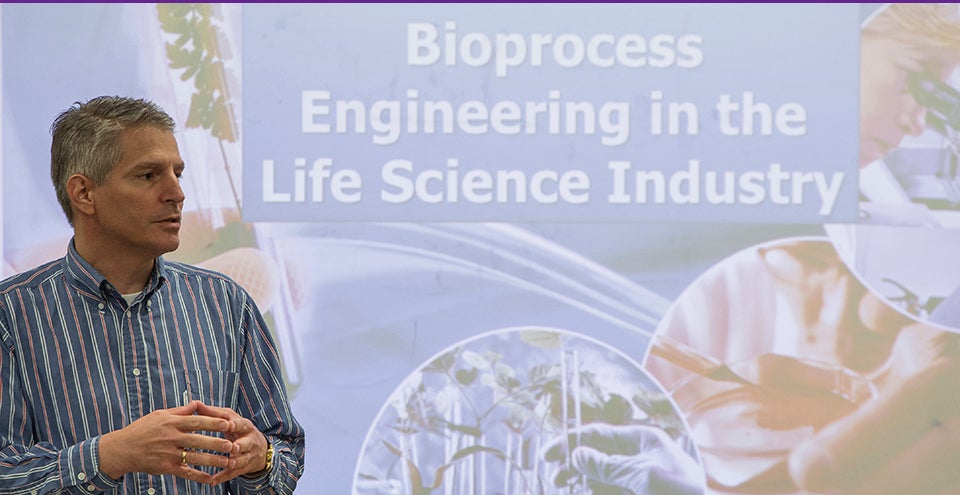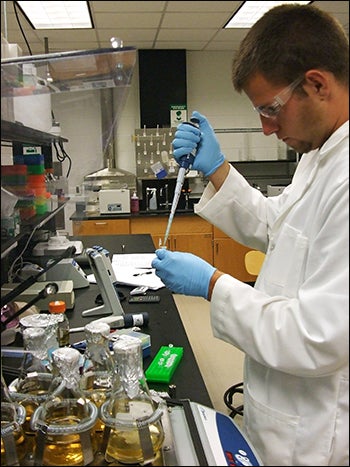ECU bioprocess engineering program growing to meet demand
ECU bioprocess engineering program growing to meet demand
Students who major in engineering with a concentration in bioprocess engineering at East Carolina University could eventually earn an $80,000 salary in a fast-growing industry that improves people’s lives – they just have to know that bioprocess engineering is an option.
“Bioprocess engineering is that one concentration within engineering that people often don’t know about. It’s not a household name like mechanical or electrical engineering,” said ECU engineering professor and concentration coordinator Dr. Loren Limberis.
Bioprocess engineering is the creation of biological products such as vaccines using live organisms and enzymes rather than inorganic chemicals and reagents, as in chemical engineering.
Insulin, a hormone manufactured to treat diabetes in those whose bodies cannot create or regulate it, is a good example of a biological product created by bioprocess engineering. Bioprocess engineers design and develop the equipment and processes used to create these products, including more effective medicines, hardier crops and cleaner fuels.
“We don’t have enough bioprocess engineers,” said Andy Ferrell ’90, ’93, an ECU industrial technology graduate who returned to campus Sept. 14 to speak to engineering students. Ferrell is the founder and president of Pharmaceutical Calibrations and Instrumentation, or PCI, a company that provides compliance services for the highly regulated pharmaceutical industry. With more than 200 clients, the company is based in Raleigh with seven satellite offices across the country.
“We’ve grown tremendously in the last 10 years, which mirrors our industry,” Ferrell said. “While overall enrollment at ECU has grown, this concentration has remained the same.”
Bioprocess engineering is one of six areas of concentration within the engineering major in the College of Engineering and Technology. Generally three to six students graduate each year with an engineering degree along with a concentration in bioprocess engineering.
The low enrollment numbers are likely due to lack of name recognition and an extra chemistry class in addition to the chemistry classes required in general engineering. Expanding the program has been a long-term goal, according to Limberis.
“We are indeed small compared to the other engineering concentrations,” Limberis said. “Our efforts to expand are mostly focused on helping define this discipline and helping prospective students and their parents really understand what the concentration is, why ECU offers it and the job prospects after graduation.”
To this end, faculty and staff are working with the engineering advisory board to adjust recruitment strategies and curriculum content. They are increasing visits to introductory science courses to reach out to freshmen and sophomores. They are also planning on revamping the concentration’s website and making a video about bioprocess engineering. Finally, they are bringing in alumni like Ferrell to share firsthand the career opportunities in this field.
“At East Carolina, you learn a lot of skill sets that will help you across the board,” Ferrell said, adding he would love to hire more bioprocess engineering graduates from ECU.
“We need some more purple and gold in my office.”
Originally from Wilson, Ferrell was accepted to multiple universities in North Carolina, but ECU “felt like home,” he said. ECU prepared him very well for his career; in fact, the idea for his graduate school thesis eventually became his company.
The students who have completed a degree concentrating in bioprocess engineering at ECU have all found full-time jobs, most before graduation and some with multiple offers.
“There is a critical need for bioprocess engineers in North Carolina,” Limberis said.
North Carolina has more than 600 biotechnology companies, the third highest in the US, with more than 61,000 employees. The life science industry in North Carolina grew 31 percent from 2001 to 2012 compared to just one percent for the total private sector in the state, according to a 2014 report by Battelle Technology Partnership Practice. This growth is four times the national average and occurred during two recessions, Limberis pointed out.
“This career is pretty much recession-proof,” Ferrell said. “People are always going to need our services.”
Recent ECU bioprocess engineering graduates have received starting offers in the range of $55,000 to $63,000. The biotechnology industry average was more than $80,000 as of 2012. For comparison, the average state private sector wage was $43,028. The global biotechnology segment was expected to post revenues of $288.7 billion in 2014, culminating a five-year average annual increase of 10.8 percent.
“I don’t think when I chose this concentration that I fully understood how much benefit this education pathway would bring me,” said senior Christina Mitchell. “The bioprocess concentration teaches you how live organisms are used to produce proteins that we would like to harvest. That’s amazing! I love that I have chosen this path.”
Mitchell works as an automation support consultant at Sequence, another company similar to PCI started by an ECU graduate, Mike Putnam ’98, ’01. Mitchell is assigned to a client site where she assists the engineering department with the design and implementation of automation changes.
“This major will definitely benefit my career,” Mitchell said. “There are so many opportunities available for all engineering majors in the pharmaceutical industry, but the bioprocess concentration teaches students about specific pharmaceutical practices.”
Limberis said, “The bioprocess engineering concentration is ECU’s commitment to help sustain the growth and fulfill the needs of the industry, and provide opportunities for our students to engage in exciting, meaningful, and professional careers.”
Pictured below, ECU engineering professor Dr. Loren Limberis speaks to engineering students about the bioprocess engineering concentration. (Photo by Cliff Hollis)


